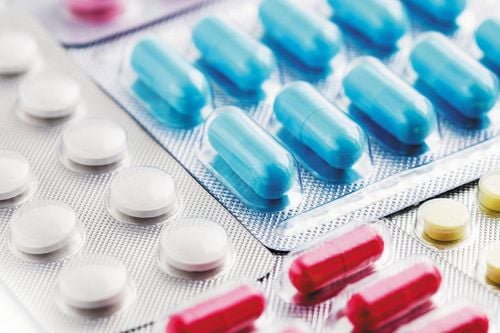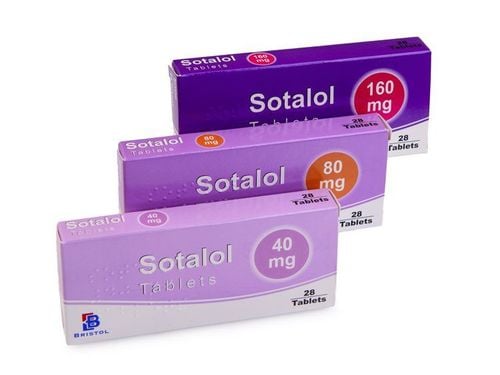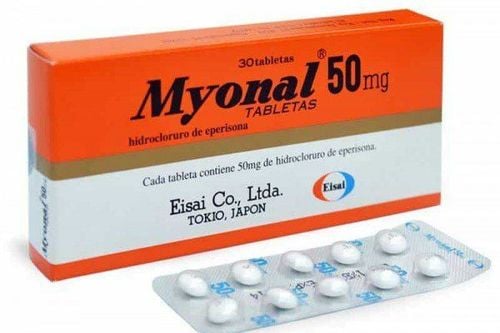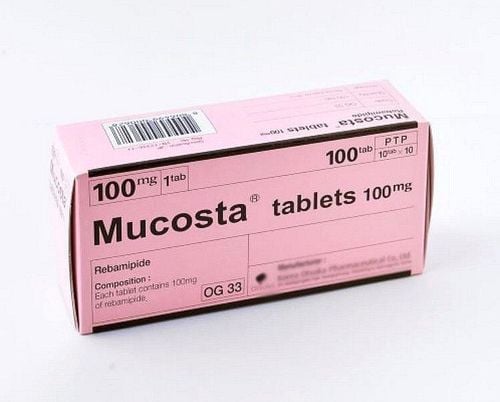This is an automatically translated article.
Micardis plus is a two-component antihypertensive drug consisting of telmisartan and hydrochlorothiazide. Telmisartan is an angiotensin II receptor antagonist and hydrochlorothiazide is a thiazide diuretic. The combination of these two ingredients has a synergistic effect of lowering blood pressure, helping to reduce blood pressure to a greater extent than using either ingredient alone.1. Micardis plus drug belongs to which group?
Micardis plus contains telmisartan and hydrochlorothiazide. Telmisartan is an angiotensin II AT1 receptor antagonist. Telmisartan is capable of displacing angiotensin II at the AT1 receptor binding site. Telmisartan binds selectively to the AT1 receptor and this binding is long-lasting. Thereby reducing the release of aldosterone, reducing vasoconstriction and helping to lower blood pressure. Telmisartan does not show affinity for other receptors, including AT2 and less typical AT receptors. Hydrochlorothiazide is a thiazide diuretic. The mechanism of action is to increase the excretion of sodium and chloride and lead to water excretion, thereby reducing plasma volume, increasing plasma renin activity, increasing aldosterone secretion resulting in increased excretion of potassium and bicarbonate in the blood. urine and decrease serum potassium. After oral administration, the diuretic effect appears after 2 hours and peaks after about 4 hours, and persists for about 6-12 hours. In summary, the drug Micardis plus is effective in the treatment of essential hypertension. This fixed-dose combination is usually indicated in patients whose blood pressure is not completely controlled on telmisartan or hydrochlorothiazide alone.2. Dosage of Micardis plus
AdultsMicardis plus should be taken once a day.
Micardis plus 40/12.5mg can be used for patients whose blood pressure is not completely controlled when taking Micardis 40mg or hydrochlorothiazide. Micardis plus 80/12.5mg can be used instead of micardis 80mg or Micardis plus 40/12.5mg in patients whose blood pressure is not completely controlled with these two drugs. Micardis plus 80/25mg can be used in patients whose blood pressure is not fully controlled on Micardis plus 80/12.5mg or in whom blood pressure is stabilized with telmisartan and hydrochlorothiazide alone. The maximum effect of the drug is usually achieved after 4 - 8 weeks of treatment with Micardis plus .
Patients with renal impairment
Due to the composition of the drug contains hydrochlorothiazide, Micardis plus should not be used in patients with severe renal impairment (CrCl < 30mL/min). Loop diuretics are preferred over thiazides in these patients.
Patients with hepatic impairment
In patients with moderate to mild hepatic impairment, the dose of Micardis plus should not exceed 40/12.5mg/day. Micardis plus is not indicated in patients with severe hepatic impairment. Thiazide diuretics should be used with caution in patients with impaired liver function.
Elderly
No dose adjustment of Micardis plus
Children and adolescents
Safety and effectiveness of Micardis plus have not been established in this population. Therefore, the drug is not recommended for these patients.
3. What are contraindications to Micardis plus?
Micardis plus is contraindicated in the following cases:Hypersensitivity to the active substance or any of the ingredients in the excipients. Pregnant women. Breastfeeding women. The patient has disorders causing cholestasis and biliary obstruction. Patients with severe liver failure. Patients with severe renal impairment (creatinine clearance < 30 mL/min). Hypokalemia, hypercalcemia unresponsive to treatment. The combination of Micardis plus with aliskiren is contraindicated in patients with diabetes mellitus or renal failure (GFR < 60mL/min/1.73m2). Use is contraindicated in patients with rare hereditary problems that may lead to incompatibility with an excipient of the drug.
4. Undesirable effects of Micardis plus
When using Micardis plus, patients may experience undesirable effects as follows:Cardiovascular: Chest pain, hypertension, peripheral edema, hypersensitivity vasculitis, hypotension (including standing), Central nervous system: Dizziness, fatigue, headache, pain, paresthesia, restlessness. Dermatology: Skin ulcers, alopecia, skin rash, toxic epidermal necrolysis, urticaria. Gastrointestinal: Diarrhea, abdominal pain, dyspepsia, nausea, loss of appetite, constipation, diarrhea, stomach irritation. Electrolytes: electrolyte imbalance. Metabolic: increased glucose, increased cholesterol, increased uric acid. Genitourinary system: Urinary tract infection. Hematology and oncology: Aplastic anemia, thrombocytopenia. Neuromuscular and skeletal: Back pain, myalgia, weakness, muscle spasms. Respiratory: Upper respiratory tract infection, sinusitis, cough, flu-like symptoms, sore throat. Hypersensitivity: Anaphylaxis, angioedema. Other: Abscess, acute renal failure, anaphylaxis, anemia, angina, anxiety, arthralgia, arthritis, asthenia, asthma, atrial fibrillation, bradycardia, bronchitis, conjunctivitis, constipation, cystitis, dependent edema, dermatitis, eczema, edema, enteritis, eosinophilia, epistaxis, erectile dysfunction, erythema, exacerbation of hypertension, fever, flushing fire, gastritis, gastroenteritis, gastroesophageal reflux, blurred vision (transient).
5. Notes when using Micardis plus
Pregnancy: Telmisartan is contraindicated during pregnancy because drugs acting on the renin-angiotensin system can cause injury and death to the developing fetus. When pregnancy is detected, the drug should be discontinued as soon as possible. Women planning a pregnancy should switch to alternative antihypertensive therapies that have been shown to be safe and effective.Lactating women: It is not known whether the drug is excreted in breast milk. Animal studies have shown that telmisartan may be excreted in milk. The manufacturer recommends not to use the drug for women who are breastfeeding.
Hepatic impairment: Patients with cholestatic disorders, biliary obstruction or severe hepatic impairment should not take Micardis plus because telmisartan is largely eliminated via the bile. Telmisartan hepatic clearance will be impaired in these patients. In patients with impaired liver function or progressive liver disease, the drug should be used with caution because minor changes in water and electrolyte balance can also lead to hepatic coma.
Renal artery hypertension: The drug has the potential to increase the risk of severe hypotension and renal failure in patients with bilateral renal artery stenosis or renal artery stenosis to the only functioning kidney.
Renal failure with hypotension and kidney transplantation: Micardis plus should not be used in patients with severe renal impairment (creatinine clearance < 30 mL/min). The experience of using Micardis plus in patients with mild and moderate renal impairment is quite limited, so it is necessary to periodically monitor serum potassium, creatinine and uric acid levels. Hypernatremia associated with thiazide diuretics may occur in patients with impaired renal function.
Intravascular volume depletion: Symptomatic hypotension, particularly after the first dose, may occur in patients with hypovolemia and/or sodium loss due to excessive diuresis, in patients with strict salt abstinence, diarrhea or vomiting. The condition needs to be corrected before giving the patient Micardis plus.
Primary aldosteronism: Patients with primary hyperaldosteronism usually do not respond to antihypertensive agents that act by inhibiting the renin-angiotensin system. Therefore, the use of Micardis plus is not recommended for these patients.
Aortic and mitral valve stenosis, obstructive hypertrophic cardiomyopathy: As with other vasodilators, special care should be taken when administering Micardis plus to patients with aortic or mitral valve stenosis. patients with obstructive hypertrophic cardiomyopathy.
Metabolic and endocrine effects: treatment with thiazide diuretics may decrease glucose tolerance. Patients with diabetes mellitus may require an adjustment in the dose of insulin or oral hypoglycemic agents during thiazide therapy. In addition, increased cholesterol and triglyceride levels have been associated with thiazide diuretics.
Electrolyte balance: patients on thiazide therapy should have their electrolytes checked periodically. Thiazide diuretics may cause water and electrolyte imbalance (hypokalemia, hyponatremia and hypochloremic alkalosis). Warning signs of water and electrolyte imbalance are thirst, dry mouth, weakness, lethargy, drowsiness, muscle aches, cramps, muscle weakness, hypotension, oliguria, tachycardia, and disturbances. digestion such as nausea and vomiting. Although hypokalemia may occur during treatment with thiazide diuretics, concomitant treatment with telmisartan may reduce the risk of diuretic-induced hypokalemia.
Hypersensitivity Reactions: Hypersensitivity reactions related to hydrochlorothiazide may occur in patients with or without a history of allergy or in patients with bronchial asthma, but are more likely to occur in patients with prior history of bronchial asthma. history as above. Exacerbation or activation of systemic lupus erythematosus has been reported with thiazide diuretics.
Overdose: The most prominent symptoms of telmisartan overdose are low blood pressure and an unusually fast or slow heart rate. Overdose with hydrochlorothiazide has been associated with decreased electrolytes (hypokalemia and hypochloremia) and dehydration due to excessive diuresis. The most common signs are nausea and drowsiness. Hypokalemia may cause muscle spasms and/or aggravate arrhythmias when used concomitantly with Digitalis or certain antiarrhythmic agents. There are currently no specific data on the treatment of overdose with Micardis plus . Patients should be closely monitored, treated symptomatically and supportively, depending on the time since taking the drug and the severity of symptoms. Serum electrolytes and creatinine should also be regularly monitored. If hypotension occurs, the patient should be placed in the supine position, with volume and salt replacement.
In summary, Micardis plus is a combination antihypertensive agent, which provides a greater antihypertensive effect than the individual components. Patients should not self-medicate, but should consult a doctor or pharmacist before use.
Please dial HOTLINE for more information or register for an appointment HERE. Download MyVinmec app to make appointments faster and to manage your bookings easily.













